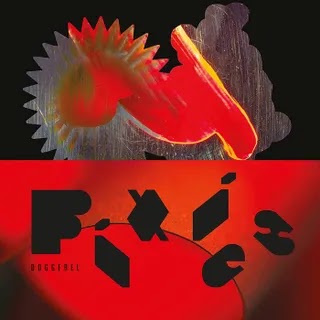On the fourth album from their reunited lineup, the alt-rock lifers choose to embrace the slowing of their step.
Doggerel marks an important milestone for Pixies, the pioneering alternative rockers who swapped their mercurial charms for dogged reliability as they aged: It is the fourth album from the reunited lineup, matching the number of full-lengths the band released at its youthful peak in the late 1980s and early 1990s.
Nothing about Doggerel sounds youthful. The band relies on chops instead of accidents to thrill, favoring production that’s clean, burly, and without a lick of grit—a sound that moves with the weight and deliberateness of middle age. Pixies choose to embrace the slowing of their step, using it to accentuate the way leader Black Francis chose refinement over exploration as he learned to sneak his idiosyncrasies into familiar song forms.
The seeds of Doggerel lie in a genre exercise. Francis had been stockpiling original tunes written in the vein of 1950s country music with the intention of cutting an Americana album with Bobby Bare Jr., a latter-day member of Guided by Voices who once toured with his own Pixies tribute group. Tom Dalgety, the producer and engineer who has been behind the band’s boards since Head Carrier, plucked “Human Crime” from the stash and had Pixies transform it into a bouncy little number that felt looser than Beneath the Eyrie, the 2019 album in which the Kim Deal-less incarnation of the band finally found its footing in the recording studio.
“Human Crime” doesn’t appear on Doggerel, yet it served its purpose: It freed Black Francis from the idea that there was a division between the songs he wrote for himself and those he penned for Pixies. He followed this notion throughout the entire first decade of the Pixies reunion, releasing six albums during a period where Kim Deal held firm to her stance that the band shouldn’t record new material. Once she left, eventually to be replaced on bass and vocals by Paz Lenchantin, Pixies immediately started making records that suggested maybe Deal was right to believe the band should’ve stuck to oldies. Indie Cindy and, to a lesser extent, Head Carrier buckled under the weight of a band attempting to live within the confines of its legacy: They spent their time hitting marks, pretending to be the group they once were.
There may be no surprises on Doggerel but, crucially, there’s no pandering, either. The band sounds at ease, even agreeable, as middle-aged rockers. Black Francis never attempts to strain to replicate his trademark wail; Joey Santiago’s guitar squalls are controlled and colorful. David Lovering lays down a thick backbeat that allows Lenchantin just enough elasticity to suggest a hint of a groove. It’s recognizably Pixies music but it’s broader, bigger, and slicker: It’s the alt-rock Voodoo Lounge, the record the Rolling Stones released some 30 years after their debut.
Like the Stones, Pixies survive because they’re road warriors, playing old favorites for audiences who consider themselves lucky to finally hear “Where Is My Mind?” performed live. Pixies operate at a much smaller scale than the Rolling Stones, of course, and modesty is also crucial to Doggerel. Once purveyors of dadaist rock, Pixies now opt for craft, constructing sturdy songs whose appeal lies in their directness. There’s little hidden here: “There’s a Moon On” gallops forth with nocturnal urgency, and “Who’s More Sorry Now?” has the vaguest hint of melancholy to its titular phrase. Black Francis—who, in a first on a Pixies album, is joined by Joey Santiago as a co-writer on two songs, the shimmering, jangly “Pagan Man” and churning “Dregs of the Wine"—writes simply and cleanly, skills honed over the years where he was leading the workaday combo Frank Black & the Catholics. As much as those first fumbling Pixies reunion records, those journeyman Catholics albums demystified the image of Black Francis the yelping madman as he resolutely settled into the limits of a working band. That same sensibility is evident on Doggerel yet the very presence of the rest of Pixies brings the album color and a bit of verve, elements that give the songs a bit of a lift. Nevertheless, there’s no denying that Pixies are now an outfit built for comfort, not speed—a group that’s found its personal sweet spot and is content to linger there.



0 comments:
Post a Comment